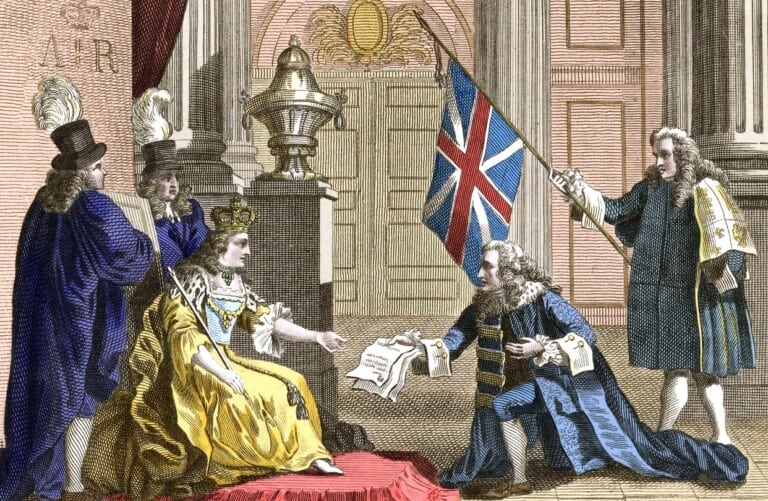Introduction
Scotland was never conquered by England. There were attempts but they failed. At the end of the 13th century, the wars of independence began.
On May 1st 1707, the Act of Union was ratified between England and Scotland: the Scottish Parliament and the English Parliament were suspended. They created the British Parliament and formed Great Britain by the Union of Scotland and England.
At the time, Scotland was already a protestant country (the Reformation came in the 16th century, before then she was catholic). As England was also protestant, the two nations grew closer.
The Queen chose several men to represent Scotland and England in a commission to discuss the terms of the Treaty of Union. Several Acts and events precipitated the Union.
1698 – 1699: expeditions to Darien
It was a total failure for the Company of Scotland :
- Scotland lost trading opportunities with France (due to the Reformation),
- the Navigation Acts (1660-1663) prevented Scotland from trading with English colonies.
In England, the East-Indian Company had monopole and money. Hence, Scotland wanted the same: that is how the Company of Scotland was set up in 1695. Its full name was “Company of Scotland Trading to Africa and the Indies”.
The East Indian was not very happy and put pressure on English financiers who wanted to provide money to the capital of the Company of Scotland. The financiers finally withdrew and the Scots had to provide money themselves: a multitude of people giving little money.
The Company of Scotland established a trading post in America: Darien, in the Isthmus of Panama. 1698 saw the 1st expedition to Darien. It was a terrible failure for many people died during the journey and by fighting against the Spaniards already settled there.
The 2nd expedition was also a failure and the people who had invested in the enterprise were ruined, just like the company. After that experience, the Scots thought the best thing would be a union with England (no more Navigation Acts and access to colonies trading).
1701: Act of Settlement (English Parliament)
The succession to the throne changed of line from the Stuarts to the Hanoverians. From 1689 to 1702, William and Mary ruled the country but they had no heir. Then, Mary’s sister, Anne came to the throne, from 1702 to 1714 but she had no heir either (in fact her child died in 1700). But what after Anne?
Before William and Mary, James II was a Catholic ruling a protestant country. The English Parliament (protestant) did not want the Stuarts to rule any longer. The new monarch had to be Protestant (it is still on today).
Since 1603 (the Union of the Crowns: still 2 different states, 2 different parliaments but one king), there was one monarch over Scotland and England so if the monarch was changed by the English Parliament, it would also affect Scotland… Therefore, the Scottish Parliament decided to vote too.
1704: Act of Security
Nobody can impose a monarch on Scotland: “We’ll choose an ‘heir’ to Anne ourselves” [threatening tone]
1705: Alien Act
The English Parliament voted that Scots who lived in England would be made aliens: they would lose rights like that of inheriting land and imports of cattle, linen and coal would be prohibited.
It was an ultimatum for Scotland to accept the Union. It never came into force since Scotland agreed to discuss a treaty.
In 1706, the Treaty of Union was signed.
May 1st, 1707: the Union came into force. It was not the result of war or conquest but a treaty signed by 2 independent countries. As in a bargain, there were advantages and disadvantages.
Advantages for England:
- question of succession to the throne solved
- peace secured on its northern border
Advantages for Scotland:
- economic opportunities (new markets)
- political influence as part of the U.K.
- key institutions protected (law, education, Presbyterian Church)
- peace with England guaranteed.
Keeping the Presbyterian Church was more important than the Parliament because it was more representative of the population (plus it controlled education).
In Scotland, the Jacobites (who supported James Stuart) threatened the Union because the line had changed from the Stuarts to the Hanoverians. The Jacobite rebellions took place in 1708, 1715, and 1745. Jacobitism was crushed at the Battle of Culloden in 1745.
After 1750, the relationships between England and Scotland were reinforced by the expansion of trade with the colonies. The Union started to bring benefits for Scots at last.

